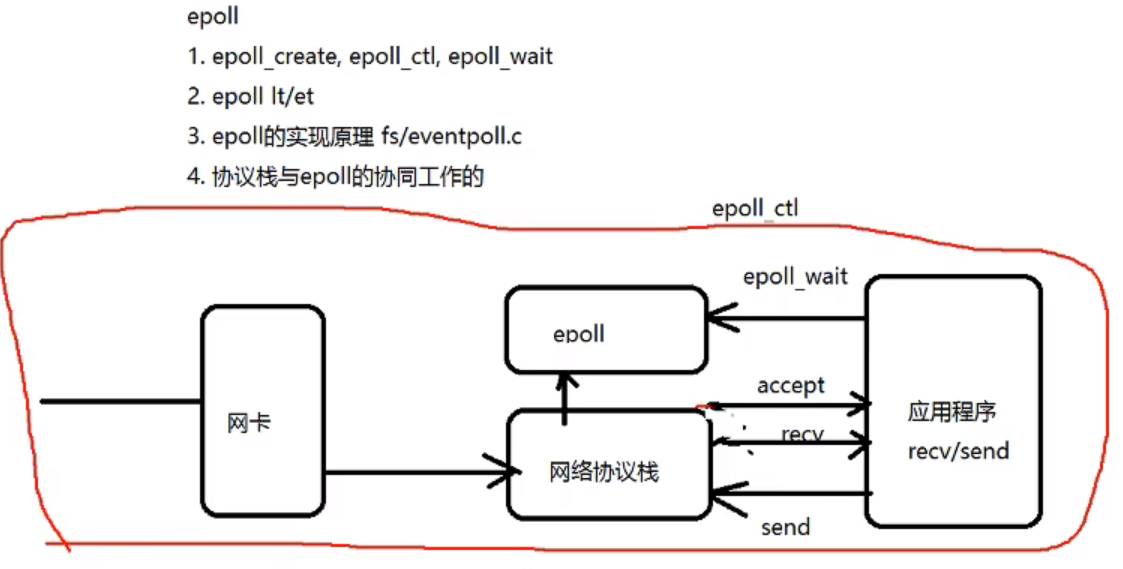1
2
3
4
5
6
7
8
9
10
11
12
13
14
15
16
17
18
19
20
21
22
23
24
25
26
27
28
29
30
31
32
33
34
35
36
37
38
39
40
41
42
43
44
45
46
47
48
49
50
51
52
53
54
55
56
57
58
59
60
61
62
63
64
65
66
67
68
69
70
71
72
73
74
75
76
77
78
79
80
81
82
83
84
85
86
87
88
89
90
91
92
93
94
95
96
97
98
99
100
101
102
103
104
105
106
107
108
109
110
111
112
113
114
115
116
117
118
119
120
|
package main
import (
"fmt"
"golang.org/x/sys/unix"
"log"
"net"
"os"
"syscall"
)
const (
//EPOLLET = syscall.EPOLLPRI | syscall.EPOLLIN //这里只是监听读事件
MaxEpollEvents = 32
)
var buf [8]byte
func echo(epollfd, fd int) {
//defer syscall.Close(fd)
//for {
nbytes, e := syscall.Read(fd, buf[:])
if nbytes > 0 {
fmt.Printf(">>> %s", buf)
_, e := syscall.Write(fd, buf[:nbytes])
if e != nil {
log.Printf("error write [%+v]", e)
}
fmt.Printf("<<< %s", buf)
}
if e != nil {
log.Printf("error %v\n", e)
}
if nbytes == 0 {
//如果无法读取,说明客户端被关闭了,要移除连接
if err := syscall.EpollCtl(epollfd, syscall.EPOLL_CTL_DEL, fd, nil); err != nil {
fmt.Println("epoll_ctl: ", err)
//os.Exit(1)
}
log.Printf("close epoll fd %v\n", fd)
}
//}
}
func main() {
var event syscall.EpollEvent
var events [MaxEpollEvents]syscall.EpollEvent
fd, err := syscall.Socket(syscall.AF_INET, syscall.O_NONBLOCK|syscall.SOCK_STREAM, 0) //创建socket
if err != nil {
fmt.Println(err)
os.Exit(1)
}
defer syscall.Close(fd)
if err = syscall.SetNonblock(fd, true); err != nil { //设置非阻塞模式
fmt.Println("setnonblock1: ", err)
os.Exit(1)
}
addr := syscall.SockaddrInet4{Port: 50000}
copy(addr.Addr[:], net.ParseIP("0.0.0.0").To4())
syscall.Bind(fd, &addr) //绑定ip,端口。
syscall.Listen(fd, 10) //监听端口
epfd, e := syscall.EpollCreate1(0)
if e != nil {
fmt.Println("epoll_create1: ", e)
os.Exit(1)
}
defer syscall.Close(epfd)
event.Events = syscall.EPOLLIN
event.Fd = int32(fd) //设置监听描述符
if e = syscall.EpollCtl(epfd, syscall.EPOLL_CTL_ADD, fd, &event); e != nil {
fmt.Println("epoll_ctl: ", e)
os.Exit(1)
}
log.Printf("ok=>enter\n")
for {
nevents, e := syscall.EpollWait(epfd, events[:], -1) //获取就绪事件
if e != nil {
if e == syscall.EINTR {
continue
}
fmt.Printf("epoll_wait: %+v\n", e)
//break
continue
}
fmt.Printf("nevent cnt = %d\n", nevents)
for ev := 0; ev < nevents; ev++ {
if int(events[ev].Fd) == fd {
connFd, _, err := syscall.Accept(fd) //接受请求
if err != nil {
fmt.Println("accept: ", err)
continue
}
syscall.SetNonblock(fd, true)
//syscall.EPOLLIN
//监听读事件, 模式是水平触发
event.Events = syscall.EPOLLIN | syscall.EPOLLPRI
event.Fd = int32(connFd)
if err := syscall.EpollCtl(epfd, syscall.EPOLL_CTL_ADD, connFd, &event); err != nil {
fmt.Print("epoll_ctl: ", connFd, err)
os.Exit(1)
}
} else {
//var rEvents uint32
if ((events[ev].Events & unix.POLLHUP) != 0) && ((events[ev].Events & unix.POLLIN) == 0) {
//rEvents |= EventErr
log.Printf("event err\n")
}
if (events[ev].Events&unix.EPOLLERR != 0) || (events[ev].Events&unix.EPOLLOUT != 0) {
log.Printf("write event\n")
}
if events[ev].Events&(unix.EPOLLIN|unix.EPOLLPRI|unix.EPOLLRDHUP) != 0 {
log.Printf("read event")
}
log.Printf("events.fd=%d\n", events[ev].Fd)
log.Printf("events %#v", events[ev])
/*go*/ echo(epfd, int(events[ev].Fd))
}
}
}
}
|



